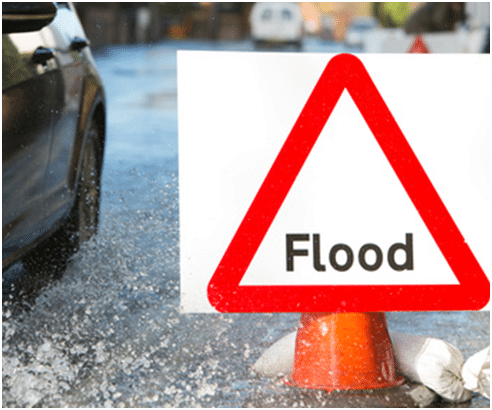When It Rains, It Floods
If you’ve lived in West Texas for long, or anywhere in Texas for that matter, you know that storm clouds form fast and the rain can fall even faster.
Do you know your duties when it comes to rainwater? Do you know what your liabilities are for floods? How do you handle flood damage claims?
Imagine This
You’re enjoying the warm sunny afternoon in your backyard when suddenly the wind picks up and sand starts whipping past you.
Unexpectedly it begins to rain. As you run inside, you notice the water running off your neighbor’s property, flowing into your yard.
The next thing you know, their patio furniture comes crashing through the fence and into the siding of your home. Now insurance refuses to cover the repairs, leaving you with nothing but damaged property and a muddy mess.
Who is Liable?
In general, neighbors are not typically liable for harm caused by the naturally occurring rain or land conditions. Drainage from a natural landscape is typically seen across land from high elevation to lower elevations. However, if your neighbor has purposefully changed the natural landscaping of their property, causing an increased amount of surface water runoff, then he may be liable.
In Texas, regulations and laws make it illegal to cause the runoff of water onto another person’s property in a manner that damages the property of another by the overflow of the water.
—See Overflow Caused by Diversion of Water-Tex. Water Code § 11.086(a)
When your neighbor alters the natural conditions of his property through landscaping that causes damage to your property, then you have certain remedies at law and in equity. Typically, this type of activity is considered a nuisance or trespass.
Types of Water Damage
Surface water is not defined in the Texas Water Code; however, courts have interpreted it to consist of water from falling rain or melting snow until it reaches a clearly defined watercourse, such as a channel or bed. Specifically, the flowing water cannot come from a clearly defined drainage system. If the water is surface water, the most common types of water damage include:
- Personal Property Loss or Damage
- Foundation Damage
- Mold or Mildew growth
- Soil Erosion
- Health Damages
What Can You Recover?
If your neighbor is responsible for water damage he has caused, you may be entitled to compensation. This can include payment for the cost of repairs or replacements of items harmed, reimbursement for expenses incurred by flooding, reimbursement of medical expenses, and possibly payment of damages to punish the neighbor if the flooding was maliciously and intentionally caused. Courts may also order the neighbor to fix certain issues caused by the flooding such as clearing debris or cleaning out drainage areas.
—See Overflow Caused by Diversion of Water-Tex. Water Code § 11.086(b)
What Are Some Other Forms of Compensation?
The simple answer is insurance. There are two different types of insurance that might cover flooding damages: homeowners insurance and flood insurance. Typically if the damaging water came from an outside source (not within your home) only flood insurance may apply. Additionally, you may be able to collect compensation from your neighbor’s insurance company.
Be sure to speak with your civil litigation attorney if you need help filing an insurance claim, or if you are considering a lawsuit against your neighbor for water damage, as there are many considerations that must be assessed prior to any action.
–Authored by Annie Northcutt, Intern
Matthew Harris Law, PLLC – Civil Litigation Division
1001 Main Street, Suite 200, Lubbock, Texas, 79401-3309
Tel: (806) 702-4852 | Fax: (800) 985-9479

